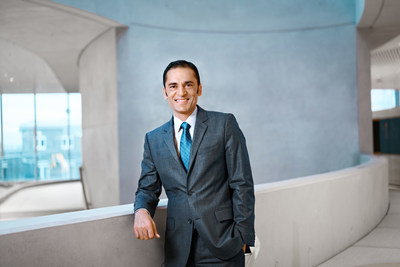Merck KGaA, Darmstadt, Germany, a leading science and technology company, hosted a panel discussion on the occasion of the 72nd World Health Assembly in Geneva, Switzerland.
- Global health leaders covered biomanufacturing and neglected tropical diseases (NTDs) during 72nd World Health Assembly
- Event focused on innovative science and technology-based solutions to increase access to medicines and biologics
DARMSTADT, Germany, May 22, 2019 /PRNewswire/ -- Merck KGaA, Darmstadt, Germany, a leading science and technology company, today hosted a panel discussion on the occasion of the 72nd World Health Assembly in Geneva, Switzerland. The panel entitled, "Leaving no one behind: from philanthropy to sustainable health solutions. How can decentralized manufacturing be part of an integrated approach to tackling NTDs and advancing Universal Health Coverage?" included some of the world's foremost health and policy experts:
- Dr. Brett Giroir, U.S. Assistant Secretary of Health
- Dr. Matshidiso Moeti, World Health Organization (WHO) regional director for Africa
- Prof. Dr. Peter Hotez, dean for the National School of Tropical Medicine at Baylor College of Medicine (Texas) and director of the Texas Children's Hospital Center for Vaccine Development
- Subhanu Saxena, regional director of Life Science Partnerships, Europe at the Bill & Melinda Gates Foundation
- Dr. Udit Batra, member of the Executive Board and CEO, Life Science business of Merck KGaA, Darmstadt, Germany

"Merck KGaA, Darmstadt, Germany is committed to advancing research and development toward the elimination of neglected and emerging illnesses, such as schistosomiasis, one of the most common and devastating parasitic diseases in tropical countries, with more than 280,000 people dying each year as a result," said Batra. "We, like the World Health Organization, aim to tackle these global challenges and offer a better quality of life."
The panel discussed the role of decentralized manufacturing as a strategy to address the problem of accessing medicines and biologics and tackling NTDs. Manufacturing of health technologies has been an objective by officials in developing countries around the world who are working with private sector partners to establish production, according to the WHO.
"We understand from both our customers and governments that there is a strong desire to bring biomanufacturing closer to patients, wherever they live, to alleviate supply chain risk, respond to endemic diseases and manufacture at an acceptable or competitive cost," Batra said. "Today's single-use and bioprocessing solutions help make that aspiration possible. We stand ready to support governments and manufacturers in advancing their decentralized biomanufacturing infrastructure to enhance patient access to life-saving biologics and biosimilars."
Since 2007, Merck KGaA, Darmstadt, Germany, through its Healthcare business sector, has been supporting the WHO in the fight against schistosomiasis in Africa. The most effective treatment for this disease to date is Cesol® 600, a tablet that contains the well-tolerated active ingredient known as praziquantel. The company produces the tablets at its plant in Mexico and covers the transport and logistical costs involved in getting the tablets to Africa, while WHO manages, monitors and documents distribution at the local level.
The company has two separate collaborations with Baylor College of Medicine, one through its Life Science business and the other through its Healthcare business. In 2017, the Life Science business formed a strategic alliance with Baylor to advance vaccine research and development for neglected and emerging infections. Also in 2017, the Healthcare business of Merck KGaA, Darmstadt, Germany began a collaboration with the Australian Institute of Tropical Health and Medicine (James Cook University, Queensland) and Baylor to research new biomarkers for the development of vaccines and diagnostics for schistosomiasis.
Follow Merck KGaA, Darmstadt, Germany on Twitter @emdgroup, on Facebook @emdgroup and on LinkedIn
About Neglected Tropical Diseases
Neglected tropical diseases (NTDs) are a set of 17 diseases that disproportionately affect more than 1 billion people living primarily in the developing world. As a leading cause of disability, NTDs carry social and economic burdens. However, according to the WHO, many of these diseases can be controlled and, in some cases, eliminated. Merck KGaA, Darmstadt, Germany is committed to research that will treat or even eliminate NTDs and has intensified its efforts to tackle NTDs as part of its campaign to provide access to health.
About Schistosomiasis
Schistosomiasis is transmitted by flatworms. By swimming or washing laundry in contaminated water, people can contract the worm larvae, which then infest their internal organs. The infection rate is especially high among children, and even when it is not fatal, the consequences are serious. In partnership with other organizations including the WHO, Merck KGaA, Darmstadt, Germany has set the goal to fully eliminate this disease.
About the World Health Assembly
The 72nd Session of the WHO's World Health Assembly (WHA) will take place in Geneva, Switzerland from 20 – 28 May 2019. The WHA is attended by delegations from all WHO Member States and focuses on a specific health agenda prepared by the Executive Board. The main functions of the World Health Assembly are to determine the policies of the Organization, appoint the Director-General, supervise financial policies, and review and approve the proposed program budget.
All Merck KGaA, Darmstadt, Germany, news releases are distributed by e-mail at the same time they become available on the EMD Group Website. In case you are a resident of the USA or Canada please go to www.emdgroup.com/subscribe to register for your online subscription of this service as our geo-targeting requires new links in the email. You may later change your selection or discontinue this service.
About Merck KGaA, Darmstadt, Germany
Merck KGaA, Darmstadt, Germany, a leading science and technology company, operates across healthcare, life science and performance materials. Around 52,000 employees work to make a positive difference to millions of people's lives every day by creating more joyful and sustainable ways to live. From advancing gene editing technologies and discovering unique ways to treat the most challenging diseases to enabling the intelligence of devices – the company is everywhere. In 2018, Merck KGaA, Darmstadt, Germany, generated sales of €14.8 billion in 66 countries.
The company holds the global rights to the name and trademark "Merck" internationally. The only exceptions are the United States and Canada, where the business sectors of Merck KGaA, Darmstadt, Germany operate as EMD Serono in healthcare, MilliporeSigma in life science, and EMD Performance Materials. Since its founding 1668, scientific exploration and responsible entrepreneurship have been key to the company's technological and scientific advances. To this day, the founding family remains the majority owner of the publicly listed company.
![]() View original content to download multimedia:http://www.prnewswire.com/news-releases/experts-discuss-decentralized-manufacturing-to-tackle-neglected-tropical-diseases-and-promote-universal-health-coverage-at-world-health-assembly-event-300854139.html
View original content to download multimedia:http://www.prnewswire.com/news-releases/experts-discuss-decentralized-manufacturing-to-tackle-neglected-tropical-diseases-and-promote-universal-health-coverage-at-world-health-assembly-event-300854139.html
SOURCE Merck KGaA, Darmstadt, Germany




